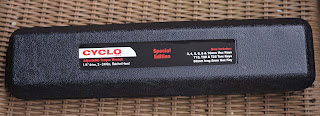I’ve never been a spendthrift. Sure, I’ve enjoyed the odd splurge now and then. However, this tends to be when I’ve really wanted, or needed something. The fixed gear winter/trainer’s V2 frameset being a case in point. I’d been wanting one since 2003 but new parenthood, bills and related expenditure put this firmly on the back burner. I finally bought one (at a very compassionate price) for Christmas two years later.
Made from in-house 4130 Cro-Moly and complete with matching fork, it was hardly exotic, or an expensive purchase but crucially responsive and engaging to ride. Fast forward 18 years and nothing remains of the original build, not so much as a spacer. The V4, though very worthy, and featuring more traditional (some would say better) seat stays failed to capture my imagination.
A few years in the wilderness, the frameset has reemerged, (albeit with some obvious developments) as the Mulo. Back is the wishbone rear triangle and the blue livery, but a much beefier head tube and more refined dropouts. Theoretically, the head tube’s size and profile mean a bigger weld platform and bigger bearings, translating in a stronger, more responsive front end but without being unduly harsh.
The Mulu has scope for 43mm (about 1.69 in) wide tyres too, compared with the V2’s 35mm limit. Now, you’d be forgiven for thinking I’d talked myself into indulging. My bike boner was indeed, leading me in that direction. However, when other costs were factored into the equation, the upgrades/improvements didn’t justify spending £435 (frame, fork and Aheadset). Besides, there was also the emotional bond between me and the V2 after all these years, many miles, and rider-centric evolutions.
Instead, I decided it was time to get testing the eXotic Carbon Titanium Seat post. 350mm long, titanium refers to the cradle hardware and our 27.2 tip the scales at a feathery 173g. I’ve gone for the Selle Royal Respiro Sport Saddle since it was handy and generally very compatible with my derriere. (264g, on account of the magnesium rails but only 7g over the Selle Italia Turbomatic Gel Flow Team Saddle, which has carbon). Yes, I spotted the slightly upward tilt and levelled accordingly.
Again, the fixed gear winter trainer is hosting-I'm leaving the Holdsworth’s Crank Brothers Cobalt3 and BBB Razer combo in situ. However, I did slip the post out and gave it a lick of grease, since I was there.
The last thing you want to introduce carbon to, is grease.
Having whipped the Genetic Syngenic TEST & REVIEW: GENETIC SYNGENIC SEATPOST (sevendaycyclist.com) out, I cleaned the seat tube with a clean rag dipped in solvent and added some gripper paste to the eXotic post. For the uninitiated, gripper pastes are designed to grip the post (or other part) reducing the torque required (and therefore, potential damage to the post/stem etc).
Most brands seem to work just fine, although I’m personally fond of Muc Off MUC-OFF CARBON GRIPPER PASTE (sevendaycyclist.com) and more recently, Peaty’s Max Grip Carbon Assembly Paste Peaty’s Max Grip Carbon Assembly Paste | cycling-not-racing (sevendaycyclist.com)
Formative impressions of the eXotic post are favourable, its light and gives that familiar buzz taming ripple across washboard tarmac. No creaking from the titanium hardware, either, which was similarly welcome, although during the first few outings, I’ve been keen to check they’re snugged tight.
Talking of snugging things tight, while giving Ursula a well-deserved wash, I discovered some minor play in the bottom bracket region. Easily purged in a matter of minutes. For the uninitiated or unfamiliar, slacken the left-hand crank arm, turn the preload clockwise-fractionally using a 10mm Allen key, then tightening the 5mm Allen bolts to 14nms.
The prevalence of carbon composites and other materials mean the torque wrench is as essential as the floor pump and excellent quality pressure gauge for home mechanics. Indeed, I’m coming to the point where compact torque wrenches are preferable for mid ride fettling and mechanicals. Most, including budget models, are perfectly accurate and pleasant to use. However, they’re also precision instruments.
Always release the tension I.e., dial them out to zero after use and don’t drop them. Some sound an audible “click” when the correct tension is achieved, some go limp, others do both. Either way, do not go beyond this. I’ve lost count of the times when I’ve heard automotive fitters go three clicks past “just to be sure”. Not people I’d want working on my vehicle.
This M-Part Torque wrench has served me well for over a decade. It’s a sub £60 model, which is intuitive to use and has an operating range between 2 and 15nms, which caters for a good spread of bicycle-related applications. JIS square taper and Octalink crank bolts, Hollowtech II bottom brackets, and cassette lockrings are obvious exceptions.
Weldtite has also sent me their Cyclo model, which casts the net a little wider range-wise (2-24nms). It also measures foot-pounds, extending its horizons to other applications, which may roll the dice in its favour.
Some generic auction site tools range from 5nms upwards, which might be fine for stem and seat collar binder bolts upwards but rules out more delicate fasteners including bottle cages, mudguard, and carrier mounts, which are typically 2nms, or so. You pays your money....On that note, I'll close with my review of the Maxxis Refuse TR tyres MAXXIS REFUSE TR FOLDING TYRE | cycling-not-racing (sevendaycyclist.com)












No comments:
Post a Comment